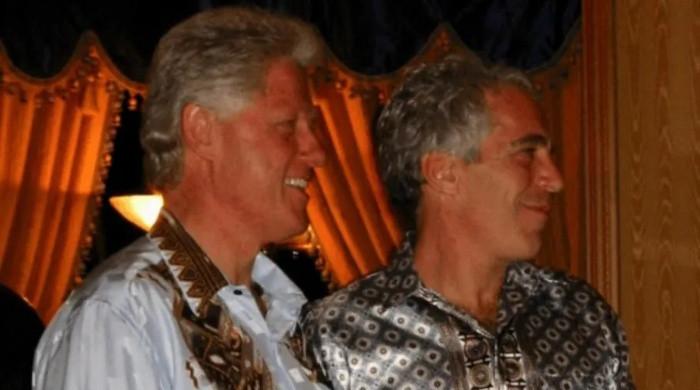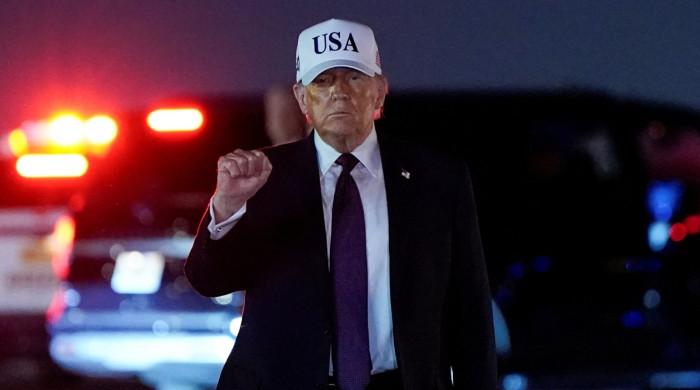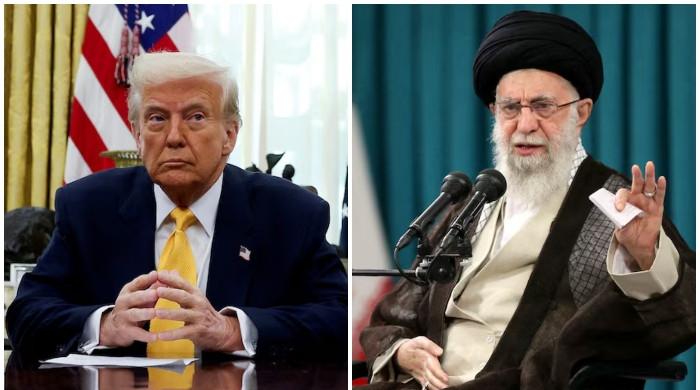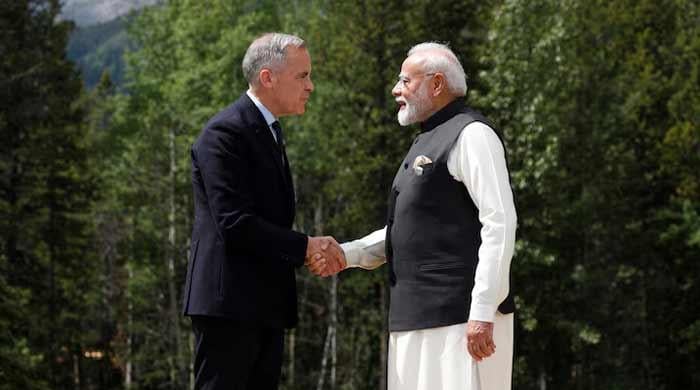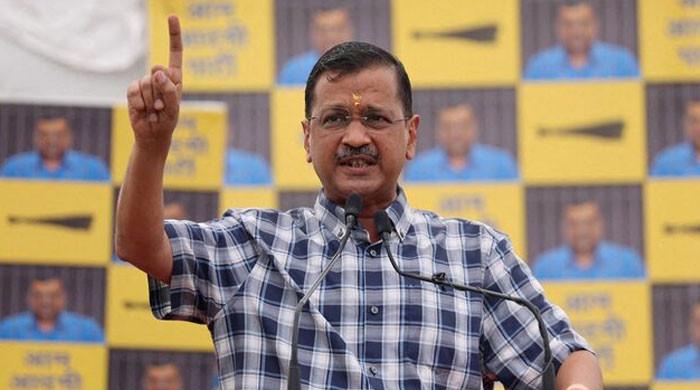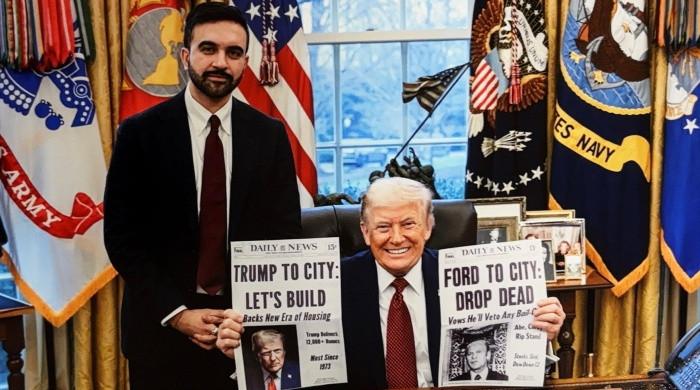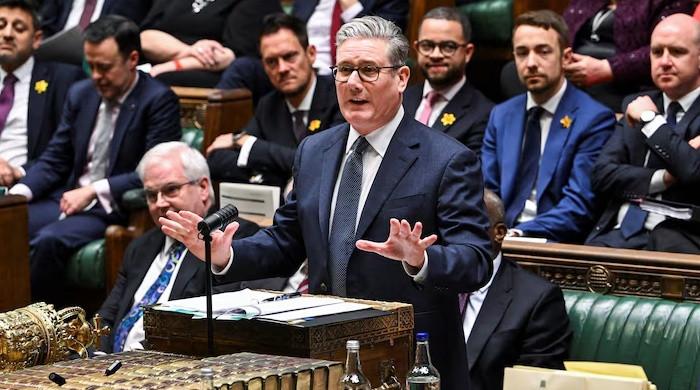Outcry in India after top general admits Pakistan downed jets in recent standoff
"The Modi govt has misled the nation. The fog of war is now clearing,” says Congress President Kharge
June 01, 2025
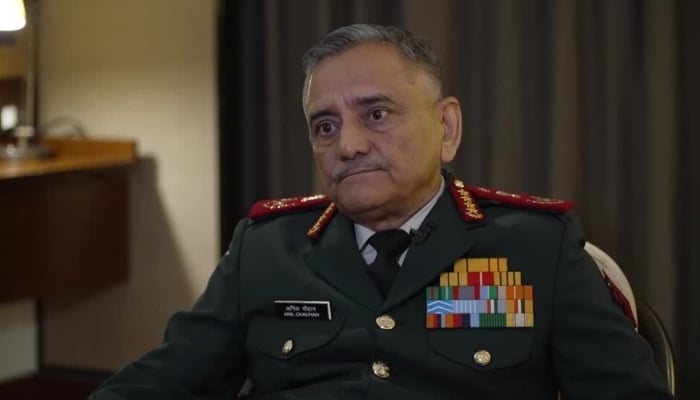
- Congress accuses Modi of misleading the nation.
- Opposition demands emergency session of parliament.
- TMC slams govt for secrecy, lack of transparency.
KARACHI: A political firestorm has erupted in India after Chief of Defence Staff (CDS) General Anil Chauhan acknowledged that the country lost several fighter jets during its recent military clash with Pakistan.
The Congress Party swiftly condemned the revelation, accusing Prime Minister Narendra Modi’s government of “misleading the nation” and calling for an urgent special session of parliament to address what it described as a grave breach of public trust and national accountability.
Congress President Mallikarjun Kharge led the charge, posting a sharp critique on X (formerly Twitter), saying: “In the wake of the remarks made by the Chief of Defence Staff (CDS) in Singapore in an interview, there are some very important questions which need to be asked."
"These can only be asked if a special session of the parliament is immediately convened. The Modi govt has misled the nation. The fog of war is now clearing,” he said.
Kharge was responding to General Chauhan’s comments in an interview with Bloomberg on the sidelines of the Shangri-La Dialogue in Singapore on Saturday.
In the interview, the CDS acknowledged for the first time that Indian fighter jets were indeed downed during recent hostilities with Pakistan. Without specifying the number of losses, Chauhan said that mistakes had been quickly identified and rectified.
“What is important is not the jets being down, but why they were being downed. The good part is that we are able to understand the tactical mistake which we made, remedy it, rectify it, and then implement it again after two days and fly all our jets again, targeting at long range”, he said.
The acknowledgement stands in stark contrast to the Modi government’s previous downplaying of Pakistani claims. Earlier this month, Islamabad had asserted that it had downed six Indian jets, a claim brushed aside by Indian officials as standard wartime posturing.
Chauhan also told Bloomberg that the four-day conflict never escalated to the point of nuclear war. “I think there’s a lot of space before that nuclear threshold is crossed, a lot of signalling before that, I think nothing like that happened,” Chauhan said,
A day earlier, senior BJP leader Subramanian Swamy had also acknowledged that Pakistan shot down five IAF jets during the recent conflict. “Pakistan downed five of our planes. They used Chinese planes to down our planes, which were French”, said Swamy.
He added that “The Chinese planes were good, but the French were not. Rafale is not up to the mark as per India’s needs.” Swamy also made a startling claim regarding the controversial Rafale deal, alleging corruption in the procurement process. According to him, “Corruption happened in Rafale which won’t be investigated till Modi is the PM”.
Kharge, citing the Indian CDS’s remarks, said in his social media post that it was now time for a “comprehensive strategic review” and reiterated the Congress’s demand for an independent expert committee, similar to the 1999 Kargil Review Committee, to assess India’s defence preparedness.
“Our IAF pilots were risking their lives fighting the enemy. We have suffered some losses, but our pilots were safe... We salute their resolute courage and bravery. However, a comprehensive strategic review is the need of the hour,” he said.
Kharge also raised the issue of US President Donald Trump’s controversial claim that he had brokered a ceasefire between India and Pakistan, calling it “a direct affront to the Simla Agreement” and questioning whether India had again allowed itself to be “hyphenated” with Pakistan, adding that “Instead of clarifying Mr Trump’s repeated assertions... PM Modi is on an election blitz, taking PERSONAL CREDIT for the valour of our armed forces”.
Two days before the Indian defence chief’s revelation, Telangana Chief Minister A Revanth Reddy had also questioned how many of India’s Rafale jets had been shot down during the conflict. Speaking at a rally in Hyderabad, Reddy said: “Rafale aircraft brought by Narendra Modi were shot down by Pakistan. There is no discussion on how many Rafales were shot down. Narendra Modi should answer.”
Reddy also demanded to know why Modi, who had previously convened an all-party meeting before engaging in war with Pakistan, did not do so before the ceasefire was announced. He went on to accuse the Indian PM of hiding the real costs of war. The BJP was quick to respond, slamming Reddy and Congress for “echoing Pakistan’s narrative”.
Congress general secretary Jairam Ramesh has also weighed in on the Rafale revelation, criticising the Indian government for allowing the CDS to reveal sensitive information through foreign media rather than informing parliament or the public directly.
“It is an extraordinary and telling commentary on Emergency@11 that the PM will not chair all-party meetings... but the nation gets to know of the first phase of Operation Sindoor through the CDS’s interview in Singapore,” he said.
Ramesh further pointed out the contrast with the Vajpayee government, which had constituted the Kargil Review Committee within days of the 1999 conflict. “Will the Modi government now take a similar step in light of what the Chief of Defence Staff has just revealed in Singapore?” he asked.
Former Indian Air Force pilot and Congress leader Uttam Kumar Reddy has also pressed the government for transparency. “It appears very clearly a Rafale fighter aircraft was downed in the four-day operations. The fact that the fighter aircraft were down is something that the Government of India needs to stop denying,” he said.
T S Singh Deo, former deputy CM of Chhattisgarh, echoed this sentiment, accusing the Modi government of deliberate obfuscation. “The question is not whether the planes crashed... the question is why they crashed and what we did afterward,” he said, quoting the CDS’s response.
The Trinamool Congress (TMC) also demanded accountability. TMC Rajya Sabha deputy leader Sagarika Ghose also questioned why such significant information came via international media rather than from Indian authorities. “Why should international media report this first? Why were these facts first not given to India’s citizens, to parliament and to people’s representatives?” she asked.
Earlier, Chauhan, when pressed as to whether India had lost any jets, appeared to confirm New Delhi had lost an unspecified number of aircraft — without giving details. “I think, what is important is that, not the jet being down, but why they were being down,” he told Bloomberg TV, speaking on the sidelines of Shangri-La Dialogue defence meeting in Singapore.
The Indian Air Force “flew all types of aircraft with all types of ordinances on the 10th”, he said. India switched tactics after suffering losses in the air on the first day of conflict with Pakistan earlier this month and established a decisive advantage before the neighbours announced a ceasefire three days later, he said.
“Most of the strikes were delivered with pinpoint accuracy, some even to a metre, to whatever was our selected mean point of impact,” Chauhan said.
Chauhan, and Pakistan’s Chairman of the Joint Chiefs of Staff General Sahir Shamshad Mirza, have both said there was no danger at any time during the conflict that nuclear weapons were considered.
“I think there’s a lot of space before that nuclear threshold is crossed, a lot of signalling before that, I think nothing like that happened,” Chauhan said. “There’s a lot of space for conventional operations which has been created, and this will be the new norm.
“It’s my personal view that the most rational people are people in uniform when conflict takes place,” he added. “During this operation, I found both sides displaying a lot of rationality in their thoughts as well as actions. So why should we assume that in the nuclear domain there will be irrationality on someone else’s part?”
Chauhan also said that although Pakistan is closely allied with China, which borders India in the north and east, there was no sign of any actual help from Beijing during the conflict. “While this was unfolding from (April) 22nd onwards, we didn’t find any unusual activity in the operational or tactical depth of our northern borders, and things were generally all right.”
He added that while hostilities had ceased, the Indian government had made it clear it would “respond precisely and decisively should there be any further terror attacks emanating from Pakistan.” “So that has its own dynamics as far the armed forces are concerned. It will require us to be prepared 24/7.”
He said cessation of hostilities is holding and will depend on Pakistan’s actions in the future. He added they have laid clear red lines.





